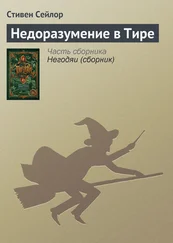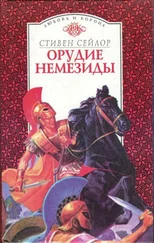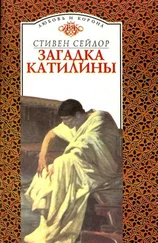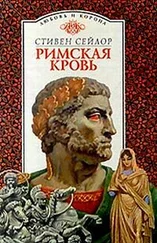Стивен Сейлор - The Throne of Caesar
Здесь есть возможность читать онлайн «Стивен Сейлор - The Throne of Caesar» весь текст электронной книги совершенно бесплатно (целиком полную версию без сокращений). В некоторых случаях можно слушать аудио, скачать через торрент в формате fb2 и присутствует краткое содержание. Год выпуска: 2018, Издательство: St. Martin's Press, Жанр: Исторический детектив, на английском языке. Описание произведения, (предисловие) а так же отзывы посетителей доступны на портале библиотеки ЛибКат.
- Название:The Throne of Caesar
- Автор:
- Издательство:St. Martin's Press
- Жанр:
- Год:2018
- ISBN:нет данных
- Рейтинг книги:5 / 5. Голосов: 1
-
Избранное:Добавить в избранное
- Отзывы:
-
Ваша оценка:
- 100
- 1
- 2
- 3
- 4
- 5
The Throne of Caesar: краткое содержание, описание и аннотация
Предлагаем к чтению аннотацию, описание, краткое содержание или предисловие (зависит от того, что написал сам автор книги «The Throne of Caesar»). Если вы не нашли необходимую информацию о книге — напишите в комментариях, мы постараемся отыскать её.
The Throne of Caesar — читать онлайн бесплатно полную книгу (весь текст) целиком
Ниже представлен текст книги, разбитый по страницам. Система сохранения места последней прочитанной страницы, позволяет с удобством читать онлайн бесплатно книгу «The Throne of Caesar», без необходимости каждый раз заново искать на чём Вы остановились. Поставьте закладку, и сможете в любой момент перейти на страницу, на которой закончили чтение.
Интервал:
Закладка:
“The women of Lemnos?” I said. “Let me think…” Every Greek island has numerous stories attached to it, and there are a great many Greek islands. Even Homer couldn’t have known all their stories.
“It’s part of the tale of Jason and the Argonauts. They stop at Lemnos on their journey.”
“Ah, yes, it comes back to me. There were no men on the island, only women. But I can’t recall why.”
“Because the women had killed all the men.” Sappho finally turned her gaze to Davus and smiled, for my son-in-law looked quite appalled at such an idea. “Well, not quite all of them. And thereby hangs the tale.”
“Which you are about to tell us, I hope.” It is always good manners to encourage one’s host or hostess when they seem ready to tell you a story.
“The trouble began when the Lemnian men sailed off to make war,” she said. “When they returned, having slaughtered a great many Thracians, they brought back as booty all the possessions of those they had killed, including their daughters and widows. But instead of treating the Thracian women as slaves, the Lemnian men took the most beautiful of them as second wives. They lavished all their attention on their new brides, and treated the Lemnian women like servants. Any who dared to protest were thrown into the streets, along with their daughters, reduced to beggars. The Lemnian women were furious. They held a secret meeting at a clearing in the forest. Among them was the unmarried daughter of the king, the princess Hypsipyle, attended by her nursemaid—Polyxo.”
I saw the slave look up at the utterance of her name, then look elsewhere as Sappho continued in her elegant Greek. “So furious were the women of Lemnos, they decided to kill every man on the island. Even the old men. Even the little boys.”
“But that’s terrible,” said Davus, whose Greek was surprisingly good. “Tell me that the princess stopped them.”
“No, she did not. Their wrath was too great to be stopped. They disbanded and went their separate ways, each going home to slaughter the males of her household. Wives killed husbands. Sisters killed brothers. Mothers killed sons. Daughters killed fathers. And of course the new Thracian wives were killed as well .
“All the Lemnian women took part in the massacre—all except Princess Hypsipyle. She, too, was caught up in the madness—until she saw a friend, a girl no older than herself, walking through the streets carrying the severed head of her own father. Hypsipyle loved her father, King Thoas. With the aid of her nursemaid, the loyal Polyxo, she contrived to smuggle him off the island.
“While the other women raged through the streets like frenzied Maenads, covered with blood and gore and crying out to Bacchus to bless the slaughter, Hypsipyle dressed her father in the ivy wreaths and sacred robes of Bacchus, covered his face with a mask of the god, and led him onto a wagon. While King Thoas stood upright, impersonating a statue of the god, donkeys pulled the wagon through the streets thronged by the Bacchic worshippers.
“The wagon reached the deserted outskirts of the city. Hypsipyle led her father into the woods and down to the seashore. They waited for days, attended only by Polyxo, who smuggled food and drink to them until at last a ship sailed close enough for Hypsipyle to summon help. The sailors agreed to allow her father aboard and to take him to safety.
“By the time Hypsipyle returned to the city, the frenzy had died down. The corpses of the dead had been burned. Not a single male was left alive. She was declared queen and ruled over an island of women. Nor did any men dare to stop at the island, because the sailors who rescued King Thoas spread the news of what had happened. For years the women lived without men, unmarried and childless, until at last Jason, ignorant of the story, decided to cast anchor off Lemnos.”
“And then what happened?” asked Davus, who stared at her spellbound.
“What happened next … is another story,” said Sappho.
“You tell the tale very well,” I said. “I think you must have inherited your father’s gift for storytelling.”
“Do you? My father always hoped it would be so, I think. Why else did he decide to call me Sappho when I was still just a child? I do attempt to write poetry, from time to time. Mere trifles. Nothing worth reciting. Certainly nothing to compare to the work of my namesake, or the work of my father. ”
“Few poets can be compared to Sappho of Lesbos, or to Cinna of Rome,” I said. “Still, there must be room in the world for other poets and other poems. I would be honored to hear some of your verses.”
I thought my words would please her. Instead, her proud bearing vanished and she turned bright red. She averted her eyes and stuttered.
“No, no, no, that would be im-im-impossible…” She folded her hands in her lap and took a deep breath. “The point of the story was to explain my father’s inspiration to name my nursemaid Polyxo. Her Nubian name was something im-im-impossible to pronounce and not pleasing to the ear—gibberish, as my father would say. So he gave her the name of the loyal nursemaid of Lemnos, who helped a devoted daughter to save the life of her father. A lovely gesture, don’t you see? My father would make everything around him—his life, his house, his household—a work of art, as perfect and pleasing as his poems. What more appropriate name for his daughter than Sappho? What better name for my nursemaid than Polyxo?”
She had regained her composure and again stared at me. “Is my father in danger, do you think?”
“I beg your pardon?”
“The word that was written in the sand in front of our doorstep—‘beware,’ in Greek. What do you make of it?”
“Did you also see it?”
“I did, before father scratched it out.”
“What did you make of it, Sappho?”
She sighed, then shrugged. “They call you Finder, don’t they? Is that why father asked for your advice, about the warning?”
“I suppose it is.” An awkward silence ensued, for I hesitated to share with her my private dealings with her father.
“What are you thinking, right now?” she asked.
I smiled. “I was thinking that you women often know more than we men give you credit for. And you do things about which your menfolk know nothing. My own wife and daughter have surprised me sometimes … and not always in a good way. You have your own ways of knowing. ”
“Our own ways?”
“Witchcraft, I mean. There, I’ve said it. Magic. Sorcery. Spells. Every woman resorts to the supernatural from time to time.”
“Yes, well, Papa writes a bit about that in the Zmyrna, doesn’t he? When the nursemaid helps Zmyrna to summon the courage to go to her father the first time, she says to her:
‘Spit three times into your hand, virgin. Like this; watch me.
Jupiter Magus, king of sorcery, delights in the number three.’”
“Yes, I remember that part,” I said.
“As do I,” said Cinna, stepping into the room.
“But I don’t think I’ve ever before heard the epithet ‘Magus’ attached to Jupiter,” I said. “Do women in their secret rites really call on ‘Jupiter the Magician’?”
“I have it on good authority that they do,” said Cinna. “A great deal of research went into that poem, one of the reasons it took so long to write. But don’t tell me the three of you have been talking about nothing but the Zmyrna since I left you.”
I shrugged. “We talked of many things. Such as—”
He clapped his hands, too excited to hear me out. “But I have news. Splendid news! Not only am I traveling to Parthia—a message from Caesar himself confirms it—but I am to join you and your son for dinner with Caesar tomorrow night.”
Читать дальшеИнтервал:
Закладка:
Похожие книги на «The Throne of Caesar»
Представляем Вашему вниманию похожие книги на «The Throne of Caesar» списком для выбора. Мы отобрали схожую по названию и смыслу литературу в надежде предоставить читателям больше вариантов отыскать новые, интересные, ещё непрочитанные произведения.
Обсуждение, отзывы о книге «The Throne of Caesar» и просто собственные мнения читателей. Оставьте ваши комментарии, напишите, что Вы думаете о произведении, его смысле или главных героях. Укажите что конкретно понравилось, а что нет, и почему Вы так считаете.












